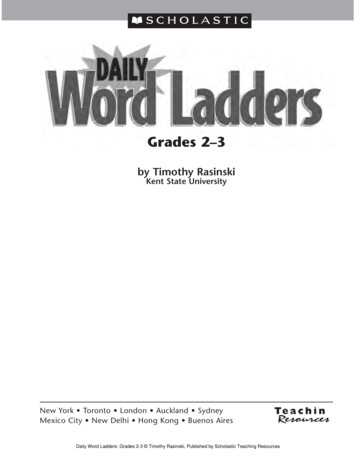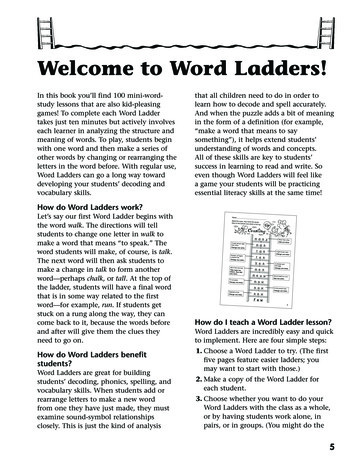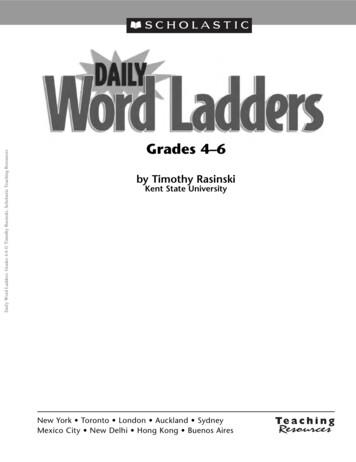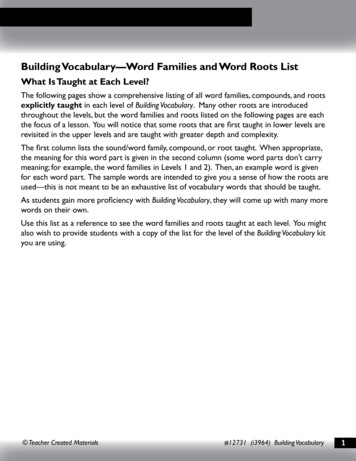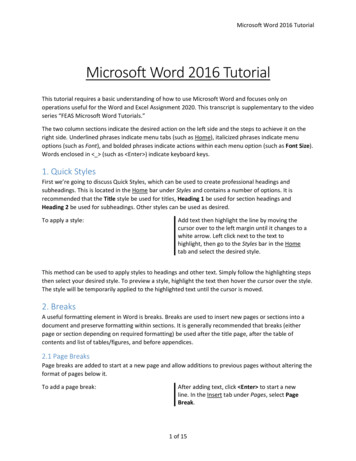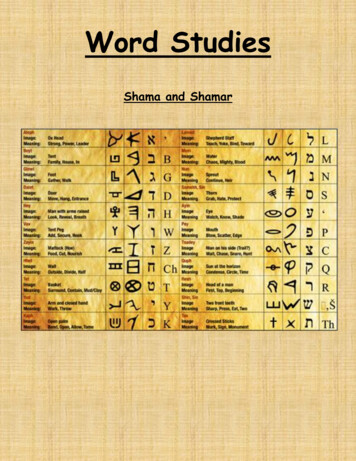
Transcription
Word StudiesShama and Shamar
c-ShinvcvvvTeeth/sharp cutting/way to obtain nourishment/pressing/consume/fire/burning desire /strength/wisdom
History & ReconstructionThe Ancient picture for this letter is, a picture of the two front teeth. This letter has the meaningsof teeth, sharp and press (from the function of the teeth when chewing). It also has the meaning oftwo, again, both or second from the two teeth.The modern Hebrew name for this letter is shin, a Hebrew word meaning tooth. Hebrew and Arabicagree that the sound for this letter is "sh".The early pictographevolved intoin the Middle Semitic script and continued to evolve intothe Late Semitic Script. From the middle Semitic script comes the Modern Hebrew ש . The MiddleSemitic script is also the origin of the Greek letter and the Latin S.in
on/mighty/above thefirmament/anoint/flow/fullness of life-flowing ofwater or blood generationally/oil/ used as a questionof what, who, where, when, or why-in the sense ofsearching in the unknown
History & ReconstructionThe Early Semitic pictograph for this letter isa picture of waves of water. This pictograph has themeanings of liquid, water and sea, mighty and massive from the size of the sea and chaos from thestorms of the sea. To the Hebrews the sea was a feared and unknown place, for this reason this letteris used as a question word, who, what, when, where, why and how, in the sense of searching for anunknown.The modern Hebrew name for this letter is “mem” probably from the word “mayim” meaning“water”. The word “mayim” is the plural form of “mah”, probably the original name for this letter,meaning “what”. The Greek name for this letter is “mu”, a Hebrew word closely related to “mah”.The sound for this letter is “m”.The Early Semiticevolved intoin the Middle Semitic and continued to evolve intoin the LateSemitic script. The Late Semitic script became the מ and (ם final mem) of the Modern Hebrew script.The Early and Middle Semitic script is the origin to the Greek and Roman M.
u-Ayinuu[uu[[[Eye/to observe with sight-insight/vision/to watch/toknow/ shade- or anything that relates to the functions ofthe eyes such as to 'see', 'understand', or 'reveal', eye fullof light or darkness, openings to ear, mouth, heart,/pupil, to know or knowledge,
History & ReconstructionThe Ancient picture for this letter is a picture of an eye. This letter represents the ideas of seeingand watching as well as knowledge as the eye is the window of knowledge.The name of the letter is ayin, a Semitic word meaning eye. This letter is silent in modern Hebrew.There is no indication that the ancient Semitic had a sound for this letter as well and appears to havebeen silent in the past. The Greek language assigned the vowel sound "o" to the letter. As Hebrew didnot have one letter for the "o" sound the Greeks took this silent letter and converted it into a vowel.The early Semiticevolved into the simplerlate Semitic period. This letter evolved into thebecame the Greek O and the Latin O.in the middle Semitic and remained the same into the ע in the modern Hebrew script. The middle Semitic
r-ReshrrrrrIndividual/thinking/using all senses of the mind/ rst part/head of the chief/ knowledge/ mind/ self/ top
History & ReconstructionThe Ancient picture for this letter is , the head of a man. This letter has the meanings of head orman as well as chief, top, beginning or first.The modern Hebrew name for this letter is resh, a Hebrew word meaning head. Hebrew, Aramaicand Greek agree that the sound for this letter is an "r".The early pictographevolved into in the Middle Semitic script and continued to evolve intothe Late Semitic Script. From the middle Semitic script comes the Modern Hebrew ר . The MiddleSemitic script is alsoin
Shama H8085 Primitive Root – VerbAyin – Mem - Shinumc\u[mv-v- Teeth/sharp cutting/way to obtain nourishment/pressing/consume/fire/burning /chaos/to question/mighty/above thefirmament/anoint/flow/fullness of life-flowing of water or bloodgenerationally/oil/ used as a question of what, who, where, when, or why-in thesense of searching in the unknown[-Eye/to observe with sight-insight/vision/to watch/to know/ shadeor anything that relates to the functions of the eyes such as to 'see','understand', or 'reveal', eye full of light or darkness, openings to ear,mouth, heart, pupil, to know or knowledge, shade,Possible Pictograph meaning: a burning desire toobtain nourishment-wisdom by chewing upon anddigesting information. To keep pressing down, andto cut into the chaos of something unknown byasking lots of questions and be cleansed by theprocess by the insight and knowledge that onegets from looking and observing somethingclosely.
This word is used to convey that we must obey Yahuah or His“commandments”. If in fact we are commanded to obey Yahuah that wouldtake away our free will. He communicates just the opposite in His writings,and when we Shama this word Shama, we see are paying keen attention tosomething with the implication that a response is required. This is the properway of looking at this word. When we apply this meaning instead of obey, itwill give a better understanding to what Yahuah is offering and saying in thescriptures. It should compel us to then be sure we respond to what thosescriptures are pointing out. We are to come out of slavery and beingcompelled to obey would put us right back. Yah wants children who want to bewith Him because they have chosen to listened to Him and really understandthe consequences of paying attention or not paying attention will be and thento make good choices based upon this clear understanding. This is afoundational stone of trust. I don’t see the Pictographs conveying the “obey”meaning. Yes one can choose to obey and that may well indeed be the mostlogical outcome, but if we just obey without questioning and considering, weare right back to being religious instead of being in a relationship.Harken (H8085): Shama owumc- verb qal imperative second person mascplural- hear with your ears with attention and interest. Understand andcomprehend so you can trust what is proclaimed and respond. Takingheed on the basis of what you heard and understood from the one who isspeaking.To hear, to have the power to hear, to hear with attention or interest-tolisten to, to understand-language, to hear-judicial cases-, to give heed, toconsent, agree, to grant request, to yield to, to hear and answer, to hearwith an understanding heart, To announce, to tell anything, to call andsummon, to try and examine, to receive news about something, to makeknown
How It has been translatedKJV Translation Count — Total: 1,159xThe KJV translates Strongs H8085 in the following manner:hear (785x), harken (196x), obey (81x), publish (17x), understand (9x),obedient (8x), diligently (8x), shew (6x), sound (3x), declare (3x),discern (2x), noise (2x), perceive (2x), tell (2x), reported (2x), misc (33x).8085. ָׁש ַמע sh ג maʿ, shaw-mah ; a prim. root; to hear intelligently (often with impl. of attention, obedience,etc.; caus. to tell, etc.):— ׳ attentively, call (gather) together, ׳ carefully, ׳ certainly, consent, consider, becontent, declare, ׳ diligently, discern, give ear, (cause to, let, make to) hear (-ken, tell), ׳ indeed, listen,make (a) noise, (be) obedient, obey, perceive, (make a) proclaim (-ation), publish, regard, report, shew(forth), (make a) sound, ׳ surely, tell, understand, whosoever [heareth], witness.8086. ְׁש ַמע shemaʿ (Chald.), shem-ah ; corresp. to 8085:—hear, obey.8087. ֶׁש ַמע Shemaʿ, sheh -mah; for the same as 8088; Shema, the name of a place in Pal. and of four Isr.:—Shema.8088. ֵׁש ַמע Sh ך maʿ, shay -mah; from 8085; something heard, i.e. a sound, rumor, announcement; abstr.audience:—bruit, fame, hear (-ing), loud, report, speech, tidings.8089. ש ַֹׁמע sh פ maʿ, sho -mah; from 8085; a report:—fame.18091. ָׁש ָׁמע Sh ג m ג ʿ, shaw-maw ; from 8085; obedient; Shama, an Isr.:—Shama.Strong, J. (2009). A Concise Dictionary of the Words in the Greek Testament and The Hebrew Bible (Vol. 2, p. 118). ָׁש ַמע shama (1033b); a prim. root; to hear:—announce(2), announced(3),announces(3), completely(1), comprehends(1), diligently(1), discern(1),disregarded*(1), gave heed(2), give earnest heed(1), given heed(2), hear(270),hear*(1), heard(363), heard for certain(1), hearing(5), hears(33), heed(5),heeded(2), indeed obey(1), keep on listening(1), listen(226), listen attentively(1),listen carefully(3), listen closely(1), listen obediently(2), listened(52), listening(12),listens(7), loud-sounding(3), made a proclamation(1), make his heard(1), make theirheard(1), make them known(1), make themselves heard(1), make your heard(1),obedient(1), obey(32), obey*(14), obeyed(21), obeyed*(5), obeying(6), obeys(1),overheard(1), pay heed(1), proclaim(15), proclaimed(6), proclaims(1), reported(3),sang(1), show(1), sound(2), sound*(1), sounded(1), summon(2), summoned(2),surely hear(1), surely heard(1), truly obey(1), understand(7), understanding(1),understood(1), witness(1).Thomas, R. L. (1998). New American Standard Hebrew-Aramaic and Greek dictionaries : updated edition.
Shamar H8104 Primitive Root – VerbResh – Mem - Shinrmc\urmv-v- Teeth/sharp cutting/way to obtain nourishment/pressing/consume/fire/ burning desire/ mighty/this letter is used as aquestion word, who, what, when, where, why and how, in the sense ofsearching for an unknown.r Individual/thinking/using all senses of the mind/ rst part/head of the chief/ knowledge/ mind/ self/ topPossible Pictograph meaning: a burning desire toobtain nourishment-wisdom by chewing upon anddigesting information. To keep pressing down, andto cut into the chaos of something unknown byasking lots of questions and be cleansed by theprocess as an individual who is using all thesenses of what is seen, heard, or perceived.Paying close attention to ones surroundings.Enabling and be capable of coming to a clear andrational conclusion of what is being presented,
and acting appropriately using discretion andwisdom.Shamar is a great word relationally to shama. Thatconveys what was understood by shama now requiresfurther action, by engaging all senses, not just the earsand eyes. It is usually translated as “keep” as in “keep thecommandments”. It does not convey the urgency orscope of the meaning of how one would engage in theaction of “keeping” something.The first meaning is to guard, preserve, to keep safe,revere something. It also implores us to be watchmen,calling out warnings of danger. And in regards to Yahuahand His instructions to call out the errors of those whodo violence to His word and name.Shamar: H8104-To keep, watch over, observe, to take care of,preserve, protect, to save, retain, to do something carefully, to observean order, stick to an agreement, keep an appointment, watchmen,guards, to be on one’s guard, ( ָׁש ַמר šā·mǎr): v.; Str 8104; TWOT 2414—1. LN 13.1–13.47 (qal) keep, i.e.,cause a state or condition to remain (Job 2:6; Ps 17:4); (qal pass.) be kept, set aside(1Sa 9:24 ); (hitp) keep oneself (2Sa 22:24; Ps 18:24[EB 23] ); 2. LN 37.119–37.126 (qal) guard, watch, i.e., limit access and movement of persons or objects inand out of an area, implying protection to or from the object being guarded (Ge
3:24); (qal pass.) be secured (2Sa 23:5; Ecc 5:12[EB 13] ), note: for qal act. ptcp.as noun, see 9070.5; 3. LN 36.12–36.30 (qal) observe, keep, i.e., obey a commandwith diligence and in detail (Lev 19:30); (hitp) observe for oneself (Mic 6:16 ); 4.LN 27.55–27.60 (qal) be careful, beware, pay attention, make sure, watch oneself,guard oneself, i.e., learn or remember information and take care to watch fordangers (Dt 5:32); (nif) be careful (Ex 23:21); 5. LN 35.36–35.46 (qal) care for,tend, keep, attend to, take care of an object, implying concern for the objects caredfor (Hos 12:13[EB 12]), note: this can be animals or other objects; (nif) cared for(Hos 12:14[EB 13]); 6. LN 31.82–31.101 (qal) revere, cling to, i.e., have aworshipful trust and reliance on an object of deity, as an extension of carefullyguarding or caring for an object (Ps 31:7[EB 6]); (piel) cling to, revere, care for(Jnh 2:9[EB 8] ), note: further study may yield more domainsSwanson, J. (1997). Dictionary of Biblical Languages with Semantic Domains : Hebrew (Old Testament)How It Is Translated:KJV Translation Count — Total: 468xThe KJV translates Strongs H8104 in the following manner: keep (283x), observe (46x), heed (35x),keeper (28x), preserve (21x), beware (9x), mark (8x), watchman (8x), wait (7x), watch (7x), regard (5x),save (2x), misc (9x).Strong, J. (2009). A Concise Dictionary of the Words in the Greek Testament and The Hebrew Bible (Vol. 2, p. 118).
More information ר mc šmr to watch, guard, keepS 8104; BDB 1036a; HAL 4:1461b; ThWAT 8:280–306; TWOT 2414; NIDOTTE 90681. The root šmr occurs in numerous Sem. languages (Akk. šamāru “to revere”; C. J. MulloWeir, Lexicon of Accadian Prayers [1934], 323; GAG §92f; Ug. once šmrm “guard,” UT no.2443; O. Eissfeldt, KS [1963], 2:385; otherwise nǵr [ nṣr 1]; Phoen.-Pun. and LachishLetters, DISO 171, 310; older Aram.: only Aḥ. 97, 101, ʾštmr “watch yourself,” DISO 310;Leander 56; Hebraism?).Older etymological attempts are summarized in GB 847b, new attempts in CPT119f., 141f., 336; cf. also L. Kopf, VT 9 (1959): 278–80. Only the suggestion of ahomonymous verb šmr “to be enraged” in Amos 1:11 (txt em) and Jer 3:5 inreference to Akk. šamāru “to be wild” has a degree of probability (GB 847f.; G. R.Driver, JTS 32 [1931]: 361–63; D. W. Thomas, JSS 2 [1957]: 390f.; M. Held,JANES 3 [1970/71]: 47–55; regarding the customary assumption of a ellipsis “to beenraged” “to keep (wrath),” see BrSynt §127b, et al.).The Hebr. OT uses šmr qal “to keep (safe), guard, preserve,” ni. “towatch out for oneself, be protected,” pi. “to revere,” and hitp. “to watchout for oneself.” Derivatives of šmr include: pl. šemār מ m “dregs of wine”(KBL 994a; cf. also P. Humbert, ZAW 62 [1949/50]: 207), šomr “ ג watch,”šemūr “ ג eyelid,” pl. šimmūr מ m “night watch,” ʾ ג and ʾašmōret (BL487) “night watch,” mišmār and mišmeret “watch, guard.”šōmer פ n (BRL 437: “lookout mountain”) Samaria (Bibl. Aram.šāmerayin Ezra 4:10, 17) is one of the numerous proper names formedwith šmr (cf. IP 177, 259; J. J. Stamm, FS Baumgartner 319, 338).2. The OT attests the verb šmr 468x: qal 427x (incl. the subst. ptcp.šōmēr “guardian” 54x; Lis. 1477a read Dan. 9:4 instead of Esth 9:4), Psa69x, Deut 60x, Prov 31x, 1 Kgs 23x, Exod and Ezek 20x each, Num 19x,Lev and 2 Kgs 16x each; ni. 37x (Deut 13x, Exod 5x), pi. 1x (Jonah 2:9),hitp. 3x (2 Sam 22:24 Psa 18:24; Mic 6:16). The following derivativesoccur: šemār מ m 5x (Isa 25:6[bis]; Jer 48:11; Zeph 1:12; Psa 75:9), šomr ג 1x (Psa 141:3), šemūr ג 1x (Psa 77:5), šimmūr מ m 2x (Exod 12:42[bis]),ʾ ג /ʾašmōret 7x (Exod 14:24; Judg 7:19; 1 Sam 11:11; Psa 63:7;90:4; 119:148; Lam 2:19), mišmār 22x (Neh 8x, Gen 6x), mišmeret 78x
(Num 29x, Ezek and 1 Chron 8x each, 2 Chron 7x, Exod and Neh 5xeach).3. (a) In the profane realm šmr qal is used like nṣr whenever theprotection (keeping) and maintenance (also the storage) of a good isinvolved. Objs. are people (Gen 4:9, brother; cf. also D. Daube, FSEissfeldt [1958], 32f., regarding the supposed responsibility for protection;1 Sam 26:15f., king; 1 Sam 19:11; 28:2; 1 Kgs 20:39, others; Deut 4:9;Psa 71:10; Job 2:6; Prov 13:3; 16:17; 21:23; 22:5, the soul the life; Mic7:5; Prov 14:3; 21:23, the mouth; Isa 56:2, the hand), animals (Gen 30:31,sheep; Exod 21:29, 36, the goring ox; 22:9; Hos 12:13; rʿh), and things(Gen 2:15, garden; 3:24, way; 2 Sam 11:16; 2 Kgs 9:14, city; 2 Kgs 11:5–7, palace; 2 Sam 15:16; 16:21; 20:3; Psa 59:1, house; Josh 10:18, cave;Prov 8:34, gateposts; 1 Sam 25:21, property; 1 Sam 9:24, meat; Gen41:35, grain; Eccl 5:12, wealth; Exod 22:6, gold and implements, etc.; alsoin the somewhat more fig. sense: Jer 8:7; Job 39:1, observance of times;Jer 20:10; Psa 56:7; Eccl 4:17, a person’s steps; Psa 39:2; Job 13:27;22:15; 33:11, one’s ways [cf. also Phoen. KAI no. 48.2]; Gen 37:11; Eccl8:2, words). Wisdom preserves a person (Prov 2:11), just as, conversely,the wise accept counsel and admonition (5:2; 13:18; 15:5; 19:8; 22:18; cf.Lachish Letter, KAI no. 194.11).In conjunction with another verb expressing action, it acquires themeaning “to do carefully” (Num 23:12; Deut 4:6; 5:1, etc.). Finally, thetranslation known from Akk. “to revere” seems to lie in the background oftwo passages (Psa 31:7, idols; Prov 27:18, lords, par. kbd pu.; see 4dregarding Jonah 2:9 pi.).In many cases the ptcp. (šōmēr) of the verb indicates, in addition to theusual watchfulness, an office that is bestowed. The result is an official titlefor court (and cult) officials: city watchmen (Isa 21:11f.; 62:6, etc.),gatekeepers (e.g., 1 Kgs 14:27), field keepers (Jer 4:17), woodsmen (Neh8:2), wardrobe keepers (2 Kgs 22:14 2 Chron 34:22), harem keepers(Esth 2:3, 8, 14f.). A corresponding title is also known from a Pun.inscription at Malta: šmr mḥṣb “quarry inspector” (KAI no. 62.7).(b) The ni. should usually be translated reflexively (“to watch out foroneself”), often in the impv. and in conjunction with pen “lest” (Gen 24:6;
31:24, 29, etc.; cf. Lachish Letter KAI no. 193.21). It can be translatedpass. in only two passages (Hos 12:14; Psa 37:28 txt?; see 4d).(c) The subst. ʾ ג /ʾašmōret “night watchman” derives (in contrastto šimmūr; see 4f) from profane usage but is also used in religiouslanguage. Since Lam 2:19 mentions the first night watch (lerōʾš ʾašmūr פ t),in which the lament over Jerusalem should begin, and since Judg 7:19cites the middle watch (hāʾašmōret hatt מ k פ n )ג as the time for Gideon’sattack, and since, finally, the morning watch (ʾašmōret habbōqer) is alsoknown (Exod 14:24: Yahuah annihilates Pharaoh’s army; 1 Sam 11:11:Saul attacks the Ammonites), one can assume that Israel divided the nightinto three segments.(d) mišmār indicates the military protection of a city (Jer 51:12; Neh4:3, 16f.; 7:3; 12:25) or generally the watchfulness (Job 7:12) that onemaintains carefully (Prov 4:23), and can also serve to designate theguarded place (prison; Gen 40:3f., 7; 41:10; 42:17, 19; Lev 24:12; Num15:34). Finally, the branch of the service that keeps watch also bears thisname (Ezek 38:7 should be so understood); the OT uses the wordprimarily for service in the temple (see 4g).The fem. form mišmeret exhibits similar meanings: “watch” (Neh 7:3par. mišmār; 2 Kgs 11:5–7 at the palace; Isa 21:8; cf. Hab 2:1), “thatwhich one guards/preserves” (Exod 12:6; 16:23, 32–34; Num 17:25; 18:8;19:9; 1 Sam 22:23; 1 Chron 12:30); cf. also “guardhouse prison” (2 Sam20:3). But one may identify a substantially more comprehensive usage ofthe word in the religious realm (see 4g).4. (a) šmr has the same semantic scope in religious statements. Thesanctuary must be protected and guarded (1 Sam 7:1, the ark; laterapparently an independent office; see 4c). In a fig. sense, the piouspreserve and keep the covenant (e.g., Gen 17:9f.), the law (Isa 56:1), loveand justice (Hos 12:7), and esp. the commandments, statutes, andinstructions of God (e.g., Gen 26:5).This last notion dominates the entire semantic field in the religiousrealm. It appears in almost all portions of the OT with widely varyingexpressions, grammatical constructions, and addressees. Only a fewreferences can be given here to indicate major foci. It involves primarily
the duty of the Levites in Lev (e.g., Lev 8:35) and in Num (e.g., Num1:53; cf. Elliger, HAT 4, 256n.6). Deut differs in that keeping thecommandments is the concern of all here (e.g., Deut 4:2; about 50x); theseideas occur often in the books that have undergone Dtr redactions and inthe Psa (21x in Psa 119 alone). Wisdom literature also appropriates thislanguage (e.g., Prov 4:4). In particular, one should observe the Sabbath(e.g., Exod 31:13f.) and other feast days (e.g., 12:17, Passover celebration;Lev 19:3, festivals) (about 20 passages in all). The observance of God’sways can also be mentioned summarily (about 10x; Gen 18:19; 2 Sam22:22 Psa 18:22; Job 23:11, etc.; derek).(b) It is repeatedly emphasized that Yah cares for people. He guards andprotects his devotees (Gen 28:15, 20, etc.). The psalmists are esp.comforted by this idea, often in the form of a promise (e.g., Psa 12:8; in allover 20x), in all manners of distress. Yahuah is the “keeper of Israel” (Psa121:4; šmr 6x in this psalm). This statement finds its most beautifulexpression in the Aaronic blessing (Num 6:24).(c) The ptcp. šōmēr also serves to designate an office in the religiousrealm. These officials are primarily the guards of the temple door, whichseems to have been an important role (e.g., 2 Kgs 12:10). They areoccasionally mentioned summarily as one of a group of three (2 Kgs 25:18 Jer 52:24: Neh 12:25).Isa 62:6 addresses the prophets as watchmen (cf. also Westermann, Isa40–66, OTL, 377f.; otherwise ṣph “to look out” is more common for thisidea, e.g., Ezek 3:17; cf. H. Bardtke, FS Eissfeldt [1958], 19–21; C. U.Wolf, IDB 4:806).(d) Of the 35 occurrences of the ni. in a reflexive meaning, 22 may beattributed to the religious realm. It expresses the notion that one shouldguard oneself against transgressions of Yah’s commandments, here toooften in the form of an impv. (e.g., Exod 19:12). Individualcommandments are also mentioned: bearing burdens on the Sabbath (Jer17:21), abstention (Judg 13:4, 13; 1 Sam 21:5), etc.The two passages that should be translated pass. exhibit religiouslanguage: Israel was protected during the exodus from Egypt by a prophetsent by Yah (Hos 12:14); the righteous are protected by Yah (Psa 37:28;
here, however, the reading mišmeshould be considered with the LXXon the basis of parallelismus membrorum).The sole pi. form in Jonah 2:9 txt? describes the behavior of those whohold to futility and thus abandon their Almighty. (cf. HP 223f.).The hitp., attested only 3x, approximates the ni. in meaning. Thesupplicant guards against sin (2 Sam 22:24 Psa 18:24). Mic 6:16 accusesthe people of adhering to the wicked ways of Omri, for which they will bepunished.(e) The subst. šemār מ m indicates the sediment of the fermenting wine,which is thus becoming pure, sediment that one does not normally drink.The godless must completely empty the cup of Yahuah’s wrath (cf. Jer25:15ff.), however, incl. even the dregs (Psa 75:9). The wine does notnormally remain on the lees. It is not a good sign, then, when the people(in an image) remain on their lees (Jer 48:11, of Moab, with šqṭ qal “torest”; Zeph 1:12, of the Jerusalemites, with qpʾ qal “to become thick,stiff”). Yahweh will entertain the nations with refined wine (zqq pu. “to befiltered”) at the end of days (Isa 25:6[bis]).(f) šomr “ ג guard” is the bridle that the supplicant asks God to providefor his mouth (Psa 141:3, par. nṣr). šemūr “ ג guard (i.e., of the eyes)”indicates the eyelid (Psa 77:5, a lament psalm: “you keep my eyelidsopen”). šimmūr is (Yahweh’s) watch on Passover night (Exod 12:42),called the “night of watching” (cf. Noth, Exod, OTL, 100).ʾ ג /ʾašmōret expresses the fact that night watches are special timesfor dialogue with God (Psa 63:7; 119:148; Lam 2:19). A thousand yearsare like a watch in the night to God (Psa 90:4).(g) mišmār occasionally indicates the unit on watch at the temple (Neh12:24[bis]; 1 Chron 26:16[bis]), once in the pl. too (Neh 13:14). Moreoften, however, mišmeret serves this purpose (24x in Num, 8x in Ezek,Zech 3:7 for Joshua, 4x in Neh, 7x in 1 Chron, and 5x in 2 Chron). Thisword can be regarded as the technical term for service at the sanctuary(tent, temple, etc.) that was performed by the Levites in particular. šmr isoften the accompanying verb: šmr mišmeret “to provide service” (cf. alsoJ. Milgrom, Studies in Levitical Terminology 1 [1970]). Finally, the subst.
(again in frequent conjunction with the verb) indicates obedience toYahweh’s commandments (Gen 26:5; Lev 8:35; 18:30; 22:9; Num 9:19,23; Deut 11:1; Josh 22:3; 1 Kgs 2:3; Mal 3:14; 2 Chron 13:11; 23:6; see3a).5. Ancient Judaism often uses the root in the same meaning as the OT(Jastrow 1600f.). As the prophets were in the OT, so now the rabbis are“watchmen” (ʾnšy mšmr, m. Bikkurim 13:12). The Qumran communitystands in the same tradition (cf. Kuhn, Konk. 135c, 224f.; G. Bertram,TDNT 9:238).The LXX infrequently translates with tērein, usually with phylassein(Bertram, op. cit. 237f.). For the NT, cf. H. Riesenfeld, “τηρέω,” TDNT8:140–51; G. Bertram, “φυλάσσω,” TDNT 9:236–44.G. SauerJenni, E., & Westermann, C. (1997). Theological lexicon of the Old Testament (pp. 1380–1384).Regarding the Night watches Parkhurst in 1829 had this to say:
In Conclusion, if we shama (carefully listen to gain understanding) andshamar (responding by acting upon and guarding the wisdom that weunderstood and now revere) from what we shama (the information wenow trust as truth because of careful studying and “chewing” on theinformation), we will be much better off than had we just obeyed andtried to “keep” a standard without fully understanding it. We activelyengage with Yahuah’s words and instructions and that brings us joy.Joy (H8342)noun common singular absolute -joy, gladness,exultation, ie a state of happiness, with a focus on making sounds and expressionsof joy. Cheerfulness, mirth , welcome (H7797)PR cwc –noun common singularabsolute to exult, rejoice, display joy. **Holman Illustrated bible Dictionary :Joy astate of delight and well being that results from knowing and serving Yahuah-joyis the fruit of a right relationship with Yahuah. It is not something we can createby their own efforts alone.
The modern Hebrew name for this letter is shin, a Hebrew word meaning tooth. Hebrew and Arabic . Shama H8085 Primitive Root . A Concise Dictionary of the Words in the Greek Testamen
